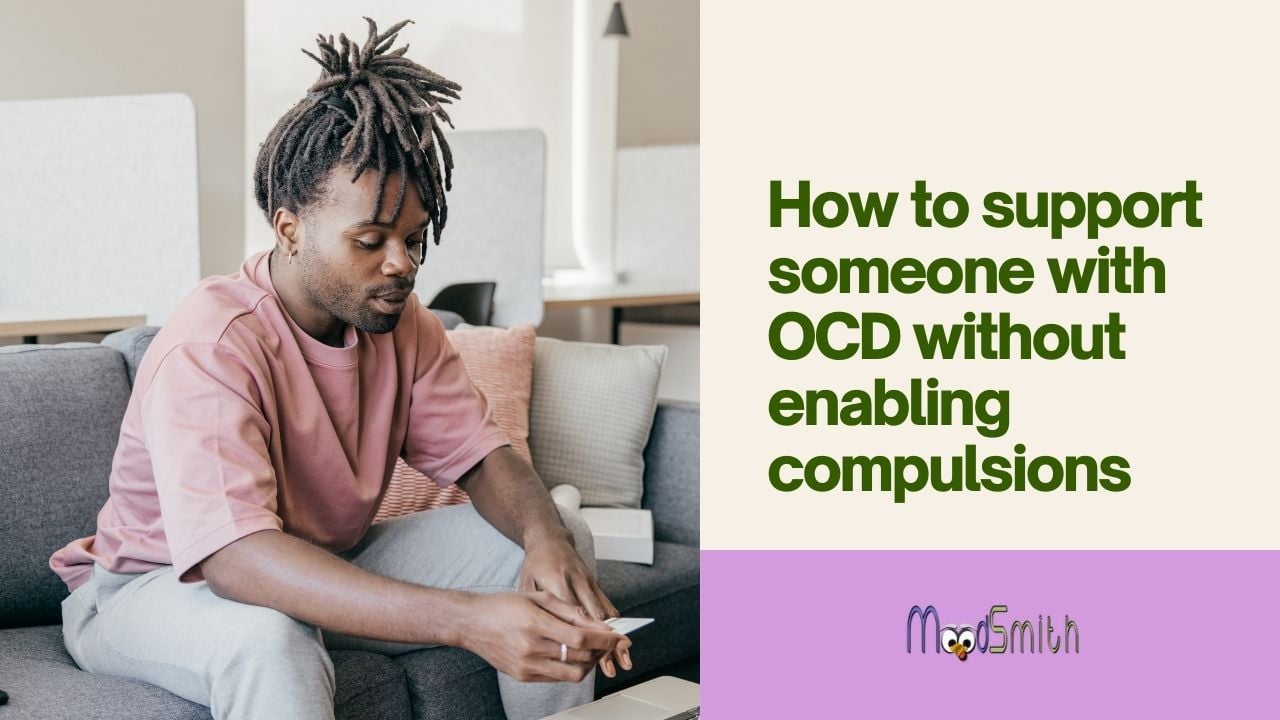Supporting someone with Obsessive-Compulsive Disorder (OCD) without enabling their compulsions can be very difficult as it can feel that you are not helping someone you care about when you can see that they are in distress; not helping goes against your natural instincts. But helping, in the long run, keeps the person with OCD firmly entrenched in their OCD, and it reinforces the very behaviours that are keeping the person with OCD stuck. For most people, they are not aware they are ‘enabling.’ I want to discuss this further in this article to explain
- how you might be enabling compulsions,
- what happens if you do that
- how to help in a way that helps the person with OCD, long-term.

Understanding OCD and Its Impact
I won’t go into detail with an explanation of OCD as that is not the focus of today’s article, but the International OCD Foundation and The Anxiety and Depression Association of America are great resources if you want to read more. The relevant aspect of OCD for the purpose of today’s article is to understand that OCD has both obsessions and compulsions, and the compulsions are carried out to ease the distress felt and to stop something bad from happening. This is why it is so difficult and distressing for the person to not carry out compulsions.
To help you understand, if you thought that doing something will stop something bad from happening, would you not want to do it?
Like many other mental health conditions, or indeed physical health conditions, the disease is not just felt by the sufferer; it impacts people around them, and in the case of OCD, it can result in a very unhelpful reciprocal relationship where the compulsions keep feeding the obsessions. If you think of this as a circular relationship, if you want to stop enabling, you need to find an exit, or a way to get off the merry-go-round.
I shall provide that exit now, with what are hopefully some skills that you can start to implement to help with person you care about.
What is enabling and how to support without enabling
Healthline gives a great explanation on enabling, stating that ‘an ‘enabler’ is someone who allows a loved ones self-destructive behaviour to continue.’ If you are reading my article wanting to help someone with OCD, you might feel a bit ‘put out’ by that definition, as it can read like blame, but that is not my intention. Most family members of friends of people with OCD, enable out of a position of love and also, as it can be easier, and less time consuming to just let the person carry on with their their rituals. Again, no blame, you are only human and not a therapist, this will be your day to day lived experience.
Enabling involves participating in or accommodating the individual’s compulsions. While it may provide temporary relief, it ultimately reinforces the OCD cycle. On the other hand, support involves helping the individual confront their fears and resist compulsions.
Setting Boundaries
Setting boundaries is a crucial part of supporting someone with OCD. It’s important to establish what you are willing and not willing to do in response to their compulsions.
For instance, you might decide not to participate in rituals or provide reassurance related to their obsessions. Communicate these boundaries clearly and compassionately, emphasizing your desire to support their recovery.
Stop Intrusive Thoughts


Online course to help manage intrusive thoughts
Encouraging Independence and Self-Management
Encouraging independence is another key strategy. This involves supporting the individual in managing their symptoms and making decisions on their own.
This can be achieved by promoting self-help strategies, such as mindfulness and cognitive-behavioural techniques. It’s also important to encourage the individual to seek professional help and engage in therapy.
Effective Communication Techniques
Effective communication is vital in supporting someone with OCD. This involves expressing your concerns without judgment, listening actively, and providing reassurance that you are there to support them, not to control or criticize their actions.
The Role of Empathy and Patience
Empathy and patience are fundamental when supporting someone with OCD. Understanding the distress caused by OCD can help you respond with compassion rather than frustration. Remember, the individual is not their disorder; they are dealing with a challenging mental health condition.
Patience is equally important. Recovery from OCD is a gradual process, and there will be ups and downs. It’s crucial to maintain a patient and supportive attitude, even when progress seems slow.
Practicing Active Listening
Active listening involves fully focusing on the individual, showing empathy, and providing feedback. This can help the person feel understood and less alone in their struggle. It’s not about offering solutions, but about validating their feelings and experiences.
Maintaining a Non-Judgmental Attitude
Maintaining a non-judgmental attitude is key. It’s important to remember that OCD is not a choice, and the individual is not to blame for their symptoms. Avoid criticizing or minimizing their experiences. Instead, offer understanding, acceptance, and encouragement.
Professional Help and Therapy Options
Professional help is often crucial in managing OCD. Therapists trained in OCD treatment can provide effective strategies to manage symptoms. They can also guide loved ones on how to support them without enabling compulsions. Most people with OCD undertake ERP if they are working with a therapist, and the goal of ERP is to eliminate the compulsions. Whatever strategies you implement to stop enabling, is helping the person with OCD in way that is familiar from ERP.
Stress Management
Supporting stress management is a crucial part of helping someone with OCD. When the person is trying hard not to engage in, or reduce their compulsions, it can create an extraordinary amount of stress. Their therapist will be working with them; giving them techniques or homework to do instead of reitualise, as the urge to carry out a compulsion is fueled by anxiety. Compulsions exist and keep going as the person quickly learns that engaging in a ritual gets rid of their anxiety, albeit it temporarily.
Stress can exacerbate OCD symptoms, so helping your loved one manage stress effectively is important. This can involve identifying stress triggers and developing strategies to cope with them.
Conclusion
In conclusion, supporting someone with OCD involves fostering a supportive environment that encourages self-management and independence. It requires patience, empathy, and understanding. By avoiding enabling behaviours and focusing on empowerment, you can help your loved one navigate their journey with OCD more effectively and confidently.
Disclaimer:
- This article is for informational purposes only and does not constitute medical advice.
- Always consult with a qualified mental health professional for diagnosis and treatment of OCD.
- Individual experiences with OCD vary, and the effectiveness of treatment approaches can differ.
